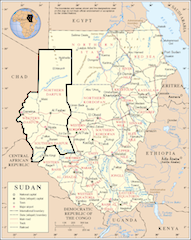Sudan’s border force linked to Darfur gold mine attacks: Amnesty
January 30, 2013 (LONDON) – Members of Sudan’s security forces were reportedly involved in January attacks that left up to 200 people dead near a goldmine in Darfur, Amnesty International said on Wednesday, calling for an urgent government investigation.

The incident, which occurred in the Jebel Amir region in North Darfur state, was sparked when a Rizeigat leader, who is also an officer in Sudan’s Border Guard, reportedly laid claim to a gold-rich area in Beni Hussein territory.
Gunmen driving government vehicles are alleged to have opened fire on people in the mostly Beni Hussein area of Kebkabiya using grenades and heavy machine guns, the human rights watchdog said in a statement extended to Sudan Tribune.
The United Nations reported that clashes between the two communities spilled over into surrounding areas, resulting in the burning and looting of a number of villages and the displacement of thousands of civilians, many of whom were in Jebel Amir to work in the gold mines.
The incident is one of the Darfur region’s worst recent outbreaks of violence, with the unrest displacing more than 70,000 people, according to government figures cited by the UN.
“The Sudanese government should immediately investigate the reports that its security officers are involved in attacks against civilians and ensure they are not involved in any further attacks,” said Audrey Gaughran, Amnesty International’s Africa director.
Amnesty said it had been told by one witness that 53 residents of his village in Martam Bay were killed in the early hours of 9 January. He said the attack was carried out by a group of gunmen in eight vehicles which included Border Guard officers whom he was able to identify by name.
Half a million artisan miners have joined a gold rush across Sudan, according to the government, which estimates it made $2.5 billion from gold exports last year.
Khartoum is currently attempting to exert greater control over the licensing and export of gold, which comes at a time of fiscal crisis, depleted foreign exchange reserves, and widespread gold smuggling.
Members of the Beni Hussein community have controlled the awarding of artisanal mining licenses in the area since the discovery of gold in March 2012.
Despite the signing of a government-brokered truce between the two communities on 17 January, attacks are reported to continue and tensions in the area remain high.
There have also been reports of further attacks by Border Guard militiamen against other Beni Hussein villages in the area on 22 and 23 January.
Militiamen have blocked roads into the region throughout January, creating shortages of essential food items and reportedly causing the deaths of vulnerable children and elderly people. UN observers were also prevented from entering the area, it was reported.
“The allegations of Border Guards committing unlawful killings and other violations in relation to control over gold resources are extremely serious, and with tensions still simmering there is a real risk of further fighting,” said Gaughran in the statement.
More than one million people are living in camps for the displaced in Darfur, a decade after rebels took up arms against the government in Khartoum, with the conflict-ravaged region in Sudan’s far west remaining a flashpoint for violent clashes, banditry and tribal unrest. The UN estimates more than 300,000 people have died in the conflict since 2003.
(ST)
